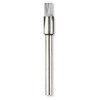falldowngoboom
Member
I've asked a ton of questions on here and gotten some great info, so I thought I'd try to give back in a some small way...
I was at the hardware store and saw a dremel attachment that seemed like it could work for cleaning primer pockets. Because it's steel, I was initially worried it would strip away too much and enlarge the pocket.
Turns out it works perfectly on my 30-06 brass. It takes the gunk out but still leaves the pocket dark, so I doubt if it strips away (hardly) any actual brass. There are also brass and nylon brushes (not sure how well nylon would work) of the same size, but the steel was all my hardware store carried.
I simply grab a big fistful of maybe 15 cases, holding them all so the pockets face up, and dremel away at high speed using a fair amount of pressure for about 2 seconds each. I've processed 80 cases so far and the bristles stay put pretty well with only several being bent outward like with an old toothbrush. I suspect the attachment will last several hundred or even a thousand cases at least. And it only cost $3.
The one I have is a 443 attachment and the brass and nylon versions are 537 and 405, respectively. You can check them out on the dremel website. http://www.dremel.com/en-us/Attachm...ducts.aspx?catid=64&catname=Polishing+Brushes
Happy Cleaning!
I was at the hardware store and saw a dremel attachment that seemed like it could work for cleaning primer pockets. Because it's steel, I was initially worried it would strip away too much and enlarge the pocket.
Turns out it works perfectly on my 30-06 brass. It takes the gunk out but still leaves the pocket dark, so I doubt if it strips away (hardly) any actual brass. There are also brass and nylon brushes (not sure how well nylon would work) of the same size, but the steel was all my hardware store carried.
I simply grab a big fistful of maybe 15 cases, holding them all so the pockets face up, and dremel away at high speed using a fair amount of pressure for about 2 seconds each. I've processed 80 cases so far and the bristles stay put pretty well with only several being bent outward like with an old toothbrush. I suspect the attachment will last several hundred or even a thousand cases at least. And it only cost $3.
The one I have is a 443 attachment and the brass and nylon versions are 537 and 405, respectively. You can check them out on the dremel website. http://www.dremel.com/en-us/Attachm...ducts.aspx?catid=64&catname=Polishing+Brushes
Happy Cleaning!


